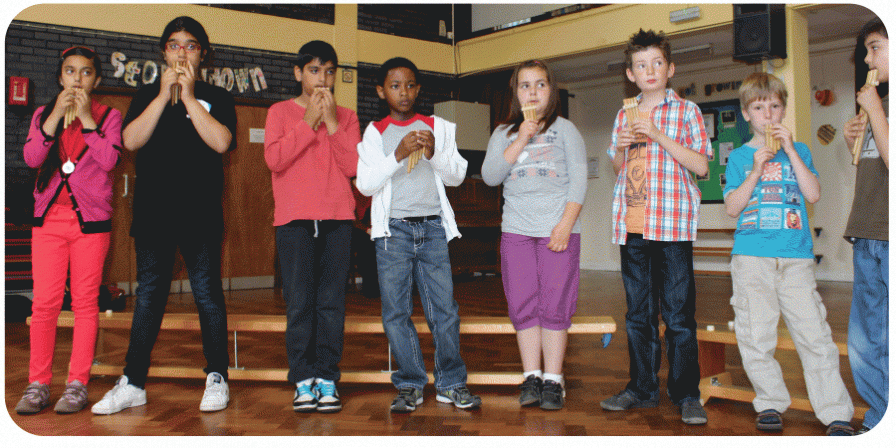The Ethnic Contemporary Classical Orchestra: Inclusion

ECCO is a project by Musiko Musika, aimed at creating inclusive and culturally diverse music ensembles. This blog post looks in-depth at inclusion.
Inclusion is ensured in several ways. The schools Musiko Musika selected in the first place were chosen because existing provision is minimal and there is diverse ethnicity. At Kensal Rise, the ECCO project occured following many fruitful years of creative music education; at Stoneydown Musiko Musika had already been working at the school for 18 months. The process of selection comes from preparation and knowledge of the children likely to be involved, of the school set-up and facilities and of the parental backgrounds.
The opportunity to participate is open to all children within a certain age range who are willing to commit to the project. There is no discrimination regarding race, culture, experience or even ability – the project is designed around the children who commit to the project rather than preselecting the most suitable. The selection process is open but comes from in-depth knowledge of the schools: Musiko Musika has built up both trust and - most importantly - familiarity between teachers, participants, parents and themselves.
Watch this video about attitudes to inclusion and diversity:
The orchestral framework is built around the real abilities and interests of the children involved, not by trying to fill the gaps of a pre-conceived professional-style orchestra (in comparison with a typical secondary school model, which might have flutes, clarinets and violins aplenty, few violas, no bassoons – but, crucially, no diversity). This is not an arbitrary process: through experience Musiko Musika has developed repertory that is coherent, educationally stimulating and interesting to the children, and relevant to their diverse backgrounds.
The rehearsal context for ECCO work allows children's voices to be heard individually, both in response to questions given by Musiko Musika, and in terms their power to steer the content and structure of the project. This, too, is a form of inclusion.
Evidence: 15/11/12 at Stoneydown: children were divided into three groups (comprising a group leader and five others) and asked to start something creative. Within 15 minutes all three groups has the basis for a composition in place, arrived at collectively. One week later the children remembered their work and added to it. There was minimal instruction or direction from Musiko Musika – the children used information already gathered from the previous weeks of work.
“The skills you learn playing in an ensemble are; working together, helping each other, teamwork. Also being able to learn new things by listening to others.” Student feedback
“The model provided by ECCO is inclusive in all aspects i.e. drawing in talented musician-teachers from a range of backgrounds and traditions, including children of different ages, abilities, social and cultural groups and in the welcome provided to all their parents”. Jayne Cominetti (Head teacher Stoneydown Park Primary School).
